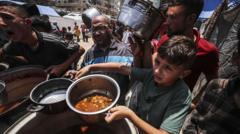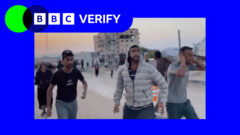The recent killing of four Palestinians near an aid distribution center in Gaza has sparked outrage and highlighted the dangers surrounding humanitarian efforts amidst ongoing conflict. While the Israeli Defense Forces claim their actions were in response to perceived threats, witnesses and health officials recount a harrowing scene as civilians sought desperately needed aid.
Tensions Escalate in Gaza as Aid Distribution is Marred by Violence

Tensions Escalate in Gaza as Aid Distribution is Marred by Violence
At least four Palestinians reportedly killed by Israeli gunfire near a newly established aid distribution center, raising concerns over humanitarian access and safety.
In a troubling escalation of violence in Gaza, health workers have reported that four Palestinians were shot and killed by Israeli fire as they approached an aid distribution center operated by the Gaza Humanitarian Foundation (GHF). This latest incident occurred near Rafah in southern Gaza, complicating an already precarious humanitarian situation worsened by a newly established aid distribution system that has invited significant criticism.
The Israel Defense Forces (IDF) state they issued warnings to a group of individuals moving toward their position, characterizing them as a potential threat before firing warning shots. They acknowledge reports of casualties but assert that the numbers reported by health workers do not match their own records. Eyewitness accounts tell a starkly different story, with individuals claiming the victims were merely waiting for food aid.
The GHF, set up with backing from the US and Israel, began operations just days prior to the incident, opening three distribution sites amid a controversial shift in humanitarian aid strategy. Previously reliant on the United Nations, which Israel accuses of inadequate oversight regarding potential Hamas diversions, this new system has drawn widespread condemnation from humanitarian organizations that view it as unethical and ineffective.
Reports indicate that the GHF's initial days raised serious concerns, with more than 60 Palestinians reported killed due to gunfire in connection with the aid distribution process. Many witnesses allege the IDF was responsible, as the military maintains that they only fired in response to perceived threats. Amid these incidents, the UN has criticized Israel's approach, asserting that the GHF framework is unworkable and emphasizing that concerns about aid diversion are overstated.
The situation in Gaza remains tense, compounded by a recent flotilla attempting to breach the Israeli blockade, which has drawn further condemnation from Israeli officials. As the humanitarian crisis deepens, the intersection of aid distribution and military engagement raises critical questions about the protection of civilians and fundamental access to life-sustaining resources in conflict zones.
The Israel Defense Forces (IDF) state they issued warnings to a group of individuals moving toward their position, characterizing them as a potential threat before firing warning shots. They acknowledge reports of casualties but assert that the numbers reported by health workers do not match their own records. Eyewitness accounts tell a starkly different story, with individuals claiming the victims were merely waiting for food aid.
The GHF, set up with backing from the US and Israel, began operations just days prior to the incident, opening three distribution sites amid a controversial shift in humanitarian aid strategy. Previously reliant on the United Nations, which Israel accuses of inadequate oversight regarding potential Hamas diversions, this new system has drawn widespread condemnation from humanitarian organizations that view it as unethical and ineffective.
Reports indicate that the GHF's initial days raised serious concerns, with more than 60 Palestinians reported killed due to gunfire in connection with the aid distribution process. Many witnesses allege the IDF was responsible, as the military maintains that they only fired in response to perceived threats. Amid these incidents, the UN has criticized Israel's approach, asserting that the GHF framework is unworkable and emphasizing that concerns about aid diversion are overstated.
The situation in Gaza remains tense, compounded by a recent flotilla attempting to breach the Israeli blockade, which has drawn further condemnation from Israeli officials. As the humanitarian crisis deepens, the intersection of aid distribution and military engagement raises critical questions about the protection of civilians and fundamental access to life-sustaining resources in conflict zones.


















